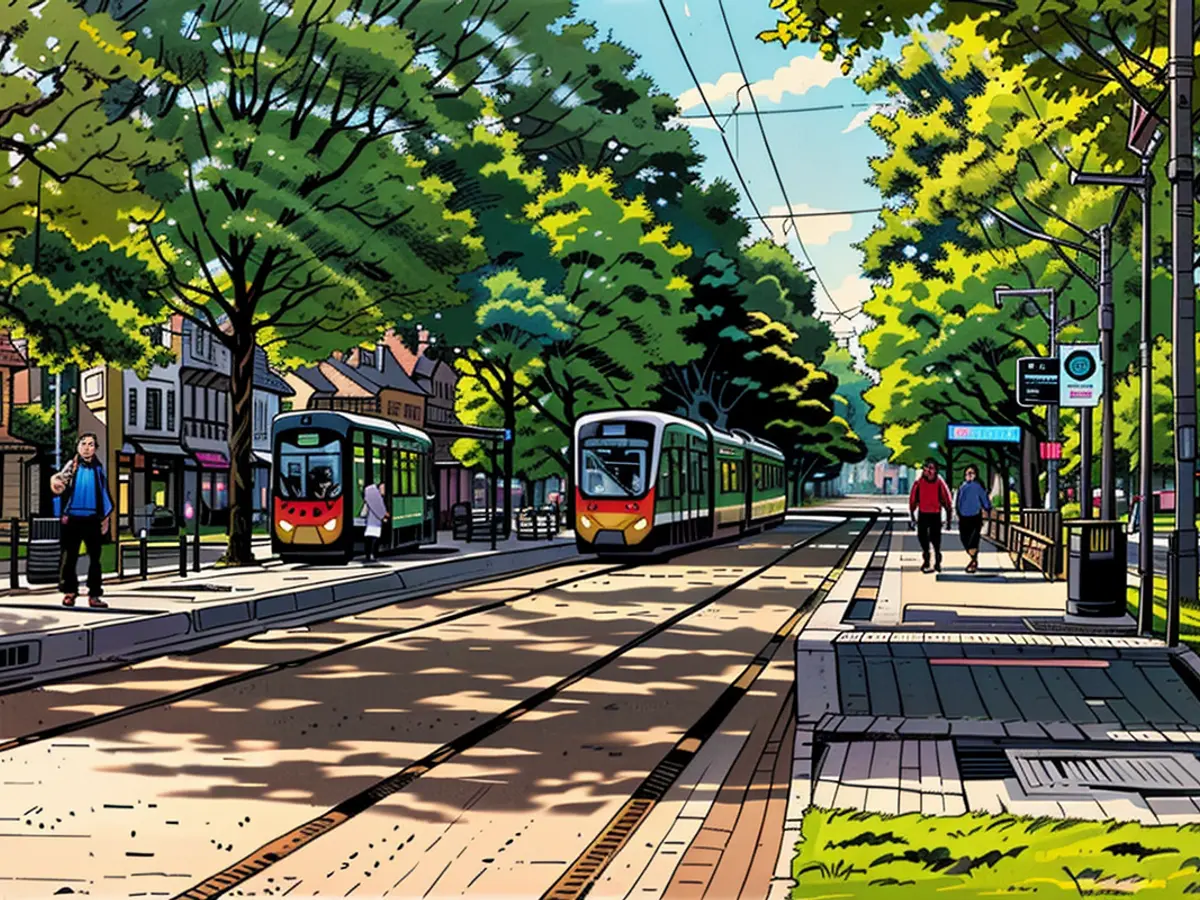Vehicle flow - Erlangen endorses the adoption of a metropolitan railway system.
One of the largest tram projects in Germany is about to take off: Erlangen's residents have voted in favor of building the city-suburban railway. According to the city's announcement online, 52.4% of eligible voters supported this initiative.
Conversely, 47.6% of voters in Erlangen were against the project. This relatively close voting outcome reflects the heated debates surrounding it over several weeks. Out of the approximate 83,000 eligible voters, 54,804 cast their votes. This figure surpassed the minimum 10% quorum.
This initiative is a significant moment in the development of public transportation within the Nuremberg metropolitan area. The City-Suburban Railway (StUB) aims to extend the existing tram in Nuremberg to Erlangen and then onwards to Herzogenaurach. The projected cost for this project is around 640 million euros - most of which (90%) will be covered by the federal and state governments.
Erlangen's Mayor, Florian Janik (SPD), expressed his delight in the decision. During an interview with Bavarian Radio, he stated, "I'm relieved by the clear outcome of the decision. This is great news for our economic and scientific location as well as for the transition towards more sustainable transportation methods."
The primary opponent of this project, the Erlangen CSU, plans to abide by the decision. Christian Lehrmann, chairman of the Erlanger CSU city council faction, said, "Although we're not entirely satisfied with the chosen route and the level of planning, the will of the city's residents holds great value for us." Eric Volleth, the CSU Mayor, underlined the necessity of healing the rifts created during the campaign, saying, "We need to put an end to the conflicts that have arisen during this process."
Nuremberg's CSU Mayor, Marcus König, also expressed relief over the decision. On his Facebook page, he wrote, "Thank you, Erlangen! We require more public transportation options in our thriving metropolitan region to ensure environmentally friendly travel from one point to another."
The contentious nature of the project sparked discussions not only in Erlangen but also in the two other cities. A diverse alliance of business, science, and politics backs the project, which includes the Friedrich-Alexander-University of Erlangen-Nuremberg and the globally renowned company, Siemens.
Simultaneously, internal divisions within the CSU surfaced. While the state government leaders Markus Söder and Joachim Herrmann (both CSU) vocally supported the tram, the Erlanger CSU campaigned vigorously against it. They cited potential construction disruptions in Erlangen and high costs as major factors in their opposition.
Ever since this project's inception, the mayors of the three cities have emphasized the financial assistance as a unique opportunity. Herrmann highlighted that the StUB would enhance the livability, attractiveness, and economic strength of the region. Söder cautioned before the vote, "If you reject this connection, nothing but fragmentation will occur."
The StUB is expected to link the Siemens campus in Erlangen's southern part to the public transportation network. This campus currently houses around 15,000 employees, with an estimated additional 2,000 added by 2026. Siemens has invested more than 750 million euros in the campus, hoping that the StUB would be implemented. The company signed a fundamental agreement pertaining to this project with the state chancellery in 2013.
In a 2016 vote, around 60% of Erlangen's residents were already in favor of the project.
Read also:
- Despite the opposition from Erlangen's CSU, Markus Söder, the leader of the Bavarian CSU and the state's Minister-President, supported the StUB project.
- In a show of unity, the mayors of Erlangen, Nuremberg, and Herzogenaurach advocated for financial assistance for the City-Suburban Railway (StUB) project.
- Florian Janik, the SPD Mayor of Erlangen, praised the Facebook page of Nuremberg's CSU Mayor, Marcus König, for expressing support for the StUB project.
- The Erlangen CSU, led by Christian Lehrmann and Eric Volleth, acknowledged the decision but anticipated addressing the route and planning concerns raised during the debates.
- The StUB project has gained the backing of various organizations in the metropolitan region, including the Friedrich-Alexander-University of Erlangen-Nuremberg and global corporation, Siemens.
- The StUB project is not only significant for Erlangen and Nuremberg but also for CENTRAL FRANCE, as it aims to improve the region's connectivity and environmental impact.
- Independent of the results, Joachim Herrmann, Bavaria's Minister of Transportation and Digital Infrastructure, reiterated the benefits of the StUB project for the region's sustainability and economy.
- The opposition faced by the StUB project in Erlangen was a reminder of the intricate dynamics within the CSU, with conflicting views between the state and local governments.
- The StUB project's approval in Erlangen has been a turning point for the metropolitan region's public transportation system, as it will particularly benefit the Siemens campus in Herzogenaurach, with approximately 17,000 employees.








